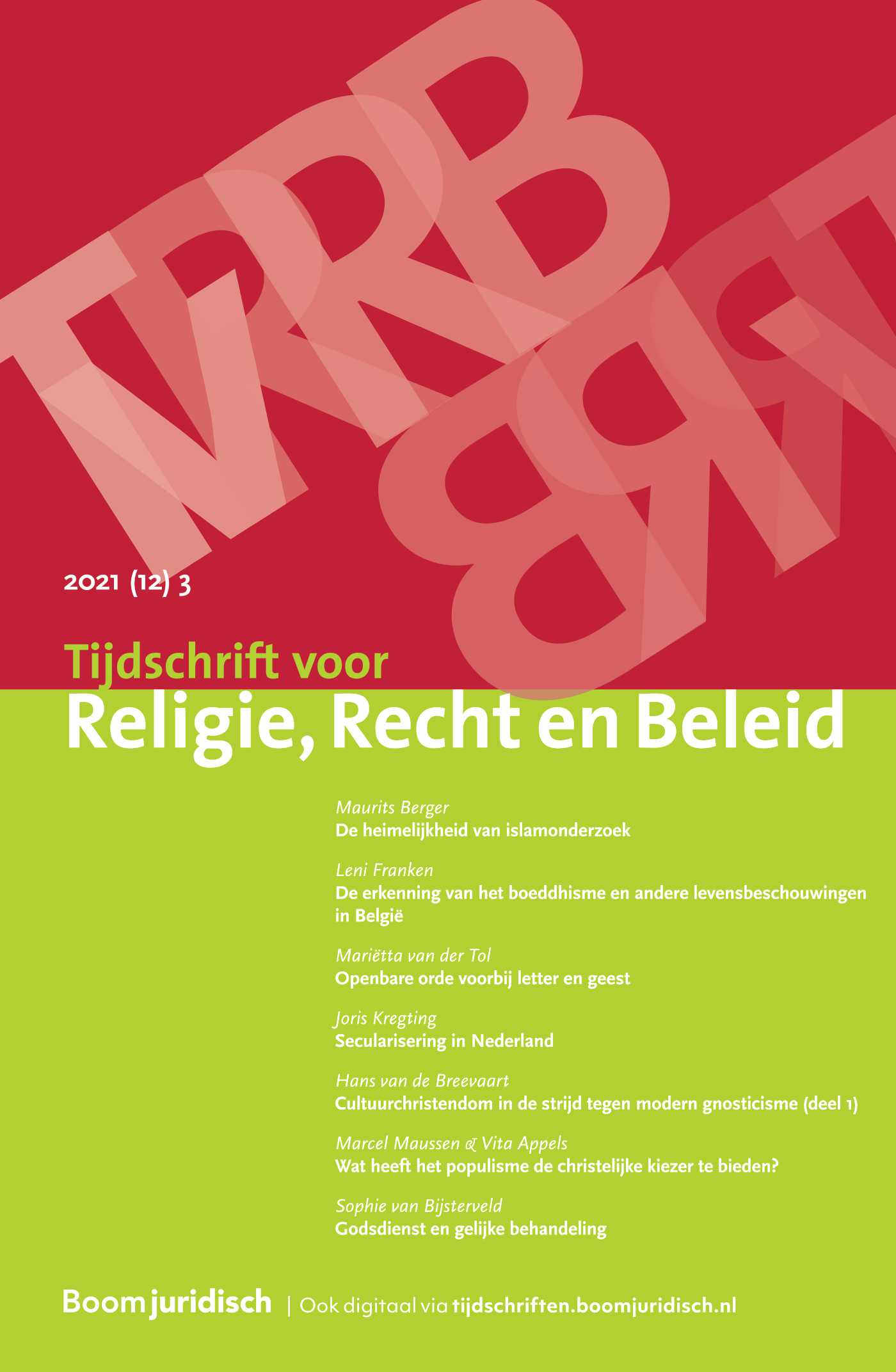|
Currently the Netherlands count 44 Hindu temples. Most of them are arranged in converted school buildings, shops and other edifices not meant to be used as a Hindu house of worship. In 2000 the first purpose-built Hindu temple was constructed, and after that date five other purpose-built prayer houses of Hindu background were built. This article analyses the interaction between the initiators and the representatives of the local governments in the process between the first plans and the ultimate result. It will become clear that the various municipalities acted differently in the implementation of the national and local regulations concerning building religious prayer houses. The people initiating the construction of these buildings also operated variously. |


Tijdschrift voor Religie, Recht en Beleid
Meer op het gebied van Algemeen
Over dit tijdschriftMeld u zich hier aan voor de attendering op dit tijdschrift zodat u direct een mail ontvangt als er een nieuw digitaal nummer is verschenen en u de artikelen online kunt lezen.
| Overwegende ... |
De vrijheid om intolerant te zijn |
| Auteurs | Prof. dr. mr. Maurits S. Berger |
| Artikel |
|
| Trefwoorden | Hindoetempel, Burgerlijke gemeente, Welstandscommissie, Rol architecten, Lokale politiek |
| Auteurs | Dr. Freek L. Bakker |
| SamenvattingAuteursinformatie |
| Artikel |
De Nashville-verklaring: over Bijbelse seksualiteit en modern zelfbegrip |
| Trefwoorden | Nashville-verklaring, Seksualiteit, Identiteit, Subjectiviteit, Zelfbegrip |
| Auteurs | Dr. Gijs van Oenen |
| SamenvattingAuteursinformatie |
|
The Nashville declaration, which espouses an orthodox Biblical view on sexuality, caused considerable public upheaval upon the publication of its Dutch translation, early 2019. This contribution investigates the declaration and the discussion it engendered from a point of view of political and legal philosophy, addressing the typically modern preoccupation with the relation between identity, subjectivity, and sexuality. This modern self-perception is unravelled from a philosophical perspective derived from Hegel and Foucault. Some conclusions are drawn regarding the paradoxical nature of both the Nashville declaration and the discussion it occasioned. |
| Artikel |
Afbakening van de godsdienstvrijheid in de context van sociale voorzieningen |
| Trefwoorden | Reikwijdte godsdienstvrijheid, sociaal grondrecht, Bijstand, sociale voorzieningen, islamitische geloofsuitingen |
| Auteurs | Mr. dr. Jos Vleugel |
| SamenvattingAuteursinformatie |
|
Invoking the fundamental social right to assistance does not prevent the CRvB from also applying the traditional fundamental right to freedom of religion. This approach is in line with the current case-law of the ECHR. This also applies to the more subjective explanation of religion used by the CRvB. This can be justified by the doctrine of interpretative restraint and the importance of self-definition. In the light of these principles, it is unclear why the CRvB makes a distinction in the level of protection of different religious expressions when weighing up interests in the context of article 9 ECHR |
| Jurisprudentie en wetgeving |
Molla Sali vs Griekenland: het Europees Hof voor de Rechten van de Mens inzake sharia in Europa |
| Trefwoorden | Sharia in Europa, religieus familierecht, legal pluralism, interpersoonlijk recht, interreligieus recht |
| Auteurs | Prof. dr. mr. Maurits Berger |
| SamenvattingAuteursinformatie |
|
The decision of the Court that Muslims from the Greek province of West Thrace can choose in matters of family law between civil or Islamic law, is not surprising. However, much can be said about the way in which the Court came to that conclusion. Because in doing so it uses principles and considerations that show a lack of insight in the status and functioning of a unique legal system, namely that of interpersonal law, or the coexistence on equal basis of several family laws. Similarly, the Court seems biased towards Islamic family law, which it consistently refers to as ‘sharia’. A critical discussion of this judgment is therefore appropriate. |

